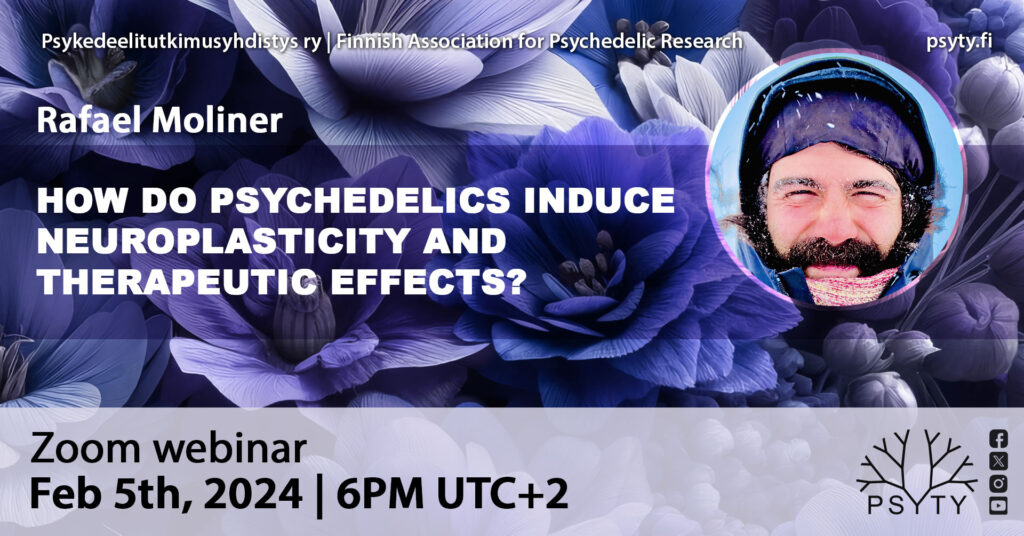Webinar February 5th 2024: Rafael Moliner – How do psychedelics induce neuroplasticity and therapeutic effects?

Recent studies have shed light on the potential use of psychedelics such as LSD and psilocybin for depression. While known for their quick and lasting antidepressant effects, the hallucinogenic properties of these substances, with the risks inherent to them, may limit their widespread clinical adoption. Recent research indicates that some of their therapeutic benefits might be harnessed without the hallucinogenic effects. This is one of the themes that biochemist and neuroscientist Rafael Moliner will cover in a webinar organized by the Finnish Association for Psychedelic Research on Monday February 5th 2024, 6PM (UTC+2).
Essentially all antidepressants, including fluoxetine and ketamine, act by binding to TrkB, the receptor for the brain-derived neurotrophic factor (BDNF). Moliner’s recent research, conducted at the University of Helsinki and published last year, discovered that LSD and psilocin directly bind to TrkB with affinities 1,000-fold higher than those for other antidepressants. The research provides additional support to the view of TrkB’s central role in antidepressant effects, suggesting new drugs that don’t activate the 5-HT2A receptor (which is relevant to psychedelic effects) as a promising new avenue of research.
There are several reasons to explore such drugs. Psychedelics can occasionally produce hallucinogen persisting perception disorder (HPPD) or irreversible psychotic episodes in susceptible populations, which has led to routinely excluding patients with a family history of bipolar disorder or schizophrenia from participating in psychedelic clinical trials. While there is intense ongoing debate on how much of the therapeutic potential of psychedelics is a direct result of the things experienced during the treatment sessions, it’s also obvious that there is need for new treatments for situations where such intense experiences are not welcome or even viable.
The event length is around 45 minutes for the lecture and 30 minutes for audience questions. The event is free of charge for everyone interested – you’ll receive a free participation link by registering here.
About the speaker: Rafael studied biochemistry at the Autonomous University of Barcelona (Spain) and neuroscience at the University of Helsinki (Finland). He developed his doctoral research at the laboratory of Eero Castrén, where he contributed to the groundbreaking discovery that antidepressants produce their therapeutic effects through direct binding and allosteric modulation of the BDNF receptor TrkB. More recently, Rafael had a leading role in the multidisciplinary research effort that unveiled how psychedelics with therapeutic potential bind to TrkB with much higher affinities than antidepressants, which could help explain their faster and more long-lasting effects on plasticity and antidepressant action. Importantly, his research also revealed that the therapeutic-like effects of psychedelics through TrkB are independent of their hallucinogenic action, which opens an avenue for the development of safer therapeutics with the fast and persistent antidepressant effects of psychedelics but devoid of hallucinations.

Comments are Disabled